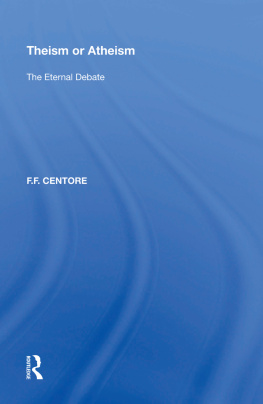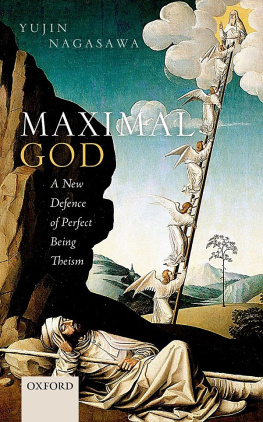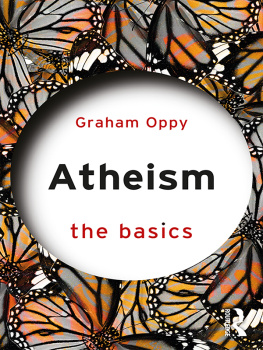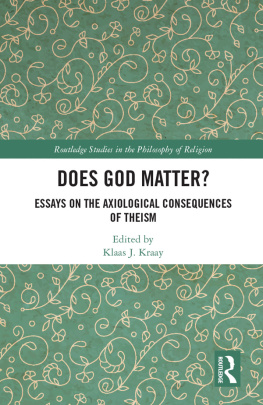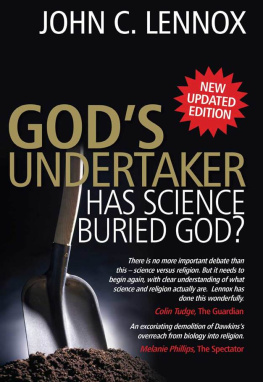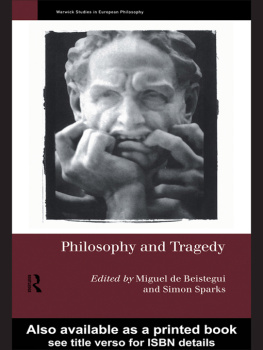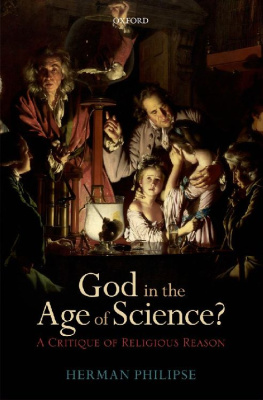THEISM OR ATHEISM
Theism or Atheism
The Eternal Debate
F.F. Centore
First published 2004 by Ashgate Publishing
Reissued 2018 by Routledge
2 Park Square, Milton Park, Abingdon, Oxon OX14 4RN
711 Third Avenue, New York, NY 10017, USA
Routledge is an imprint of the Taylor & Francis Group, an informa business
F.F. Centore 2004
F.F. Centore has asserted his moral right under the Copyright, Designs and Patents Act, 1988, to be identified as the author of this work.
Typeset in Times Roman by J.L. & G.A. Wheatley Design, Aldershot.
All rights reserved. No part of this book may be reprinted or reproduced or utilised in any form or by any electronic, mechanical, or other means, now known or hereafter invented, including photocopying and recording, or in any information storage or retrieval system, without permission in writing from the publishers.
A Library of Congress record exists under LC control number: 2003043682
Notice:
Product or corporate names may be trademarks or registered trademarks, and are used only for identification and explanation without intent to infringe.
Publishers Note
The publisher has gone to great lengths to ensure the quality of this reprint but points out that some imperfections in the original copies may be apparent.
Disclaimer
The publisher has made every effort to trace copyright holders and welcomes correspondence from those they have been unable to contact.
ISBN 13: 978-0-815-39841-7 (hbk)
ISBN 13: 978-1-351-14476-6 (ebk)
Contents
Guide
In this work I examine what can be said about the existence and nature of God without the direct aid of scripture. Doing this is called philosophical or natural theology, an undertaking just as valuable today as it was centuries ago. It depends upon the use of our native rational powers, our ability to reason logically, open debate, and our capacity to use appropriate life experiences. In conformity with proper rational procedure, it means sticking to the facts. But which facts?
Some facts are more pertinent than others to natural theology. Irrelevant facts would include information about the number of people belonging to religion R. In order to know the number we must meet at least two conditions. First, R must have a well-defined set of doctrines. Saying, for instance, that the members of R do not agree on anything is the same as saying that all we have is a name with nothing behind it. Second, the membership must really believe in those doctrines. In many cases there is no set of core teachings defining R. And even if there is, as in the case of the Roman Catholic Church, many 'members' do not follow the core teachings. Many 'members' are only 'cafeteria' members, picking and choosing this or that part of R as they see fit. Consequently, specifying numbers is misleading and thus best avoided.
In addition, as they say in the social sciences, the plural of anecdote is data. Clever people can play with numbers. For example, if organization ` is short on members, all its leaders need do is reduce the requirements for membership and thereby immediately realize an increase in membership. Whether with respect to university admissions or to the priesthood, one way to increase the number of recruits is by decreasing the conditions required to join. The shorter the creed, the longer the membership list.
Also misleading is the notion that we can take someone's word for membership in R. You cannot bear witness to yourself in such matters. Can you be a Muslim, a Jew, or a Hindu simply because you claim to be? If you could get away with making such a claim on your own authority, you could also get away with awarding yourself a Harvard MD degree or issuing yourself a Canadian passport. Are you a loyal and devoted member of R? Am I? That is not for me to say and it is not for you to say. Deciding who is and who is not a loyal and devoted member of R requires a standard drawn from the real world outside of one's own peculiar psychological condition. If there is no objective measure, then there is no R (no church), only a collection of Rs (churches), each with a grand total membership of one.
, to clear the ground of various superficial arguments raised against religion and the existence of God. Discussions in this area are sometimes sidetracked by useless objections. To be meaningful, all sides must be willing to consider the evidence in a serious way. If they are not, then there is really no discussion at all, but only trench warfare, with each side hurling verbal abuse at the other. In this regard, all forms of extremism must be avoided. Some people, for example, refuse to spell God with a capital letter, as if doing so would show a commitment to God's existence. Forgetting that the use of capitals is dictated by the rules of grammar, not by religious beliefs, they may as well refuse to spell Bambi, Mickey Mouse, or Popeye with capital letters.
Appropriately, since it is the argument against the existence of God that is most often raised, pays special attention to this problem. I discuss the problem with particular reference to moral evil. Why, for instance, is it wrong for you and me not to care for the poor? Thinking of the economically poor as a class of people deserving attention originated among the ancient Jews. Going back to about 600 BC, according to Deuteronomy 15, the Israelites were under direct orders from God to care for the poor. However, if the God of Abraham, Isaac, and Jacob is dead, why bother?
are devoted to outlining the main ways in which God or The Divine have been defined throughout the many years of human thinking on the subject. In these chapters some attention is paid to various forms of religion found in places such as China, India, and the Near East. I also look at the main variations found within the monotheistic supernaturalistic view of God.
The remainder of the work, , sets out a sampling of the basic arguments for the existence of God. There are at least two ways of doing this: one way is to follow the chronological order of the thinkers; another way is to look at the types of argument used. My approach is the latter. I take at least one sample from each of the different types. As it turns out, contemporary writers have not really added any significant content to the basic arguments. Examples, illustrations, and forms of expression change, but the basic arguments remain the same.
The presentation of each argument follows a certain pattern. First, the argument is outlined according to the mind of the thinker most noted for using the argument. This outline is then followed by a critique of the argument, again as much as possible adhering to the thinking of the critic. Sometimes the critique is short and sometimes lengthy. In many cases, the critique of one thinker's position is the whole position of another thinker. For example, Hegel's view is an attempt to correct the view previously defended by Kant.
In another case, all those who elevate essences to the highest rank in their approach to reality are critics of someone such as Aquinas, a thinker who regards existence as the pinnacle of reality and human thought. By the same token, Aquinas is the major critic of all those following the path of essences. Those who concentrate on essence are concerned primarily with the question 'What is it?' rather than 'Is it?' This is the typical way of proceeding in the sciences. Knowing the formula, the definition of the thing or process, the idea of the thing, is of greatest significance, so much so that whether or not the thing exists is something we can ignore. Can there be a science of dinosaurs? Textbooks in science are always written in a generalized, abstract way. Science always aims at attaining universal and necessary knowledge of the material world. In contrast, without denying the importance of definitions and concepts, Aquinas regards the existential question as the most important of all possible questions.

